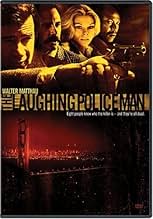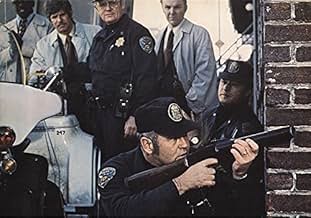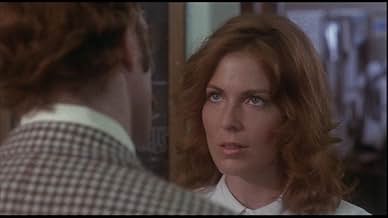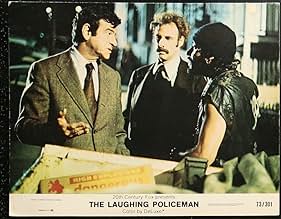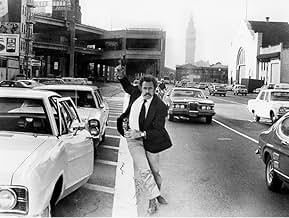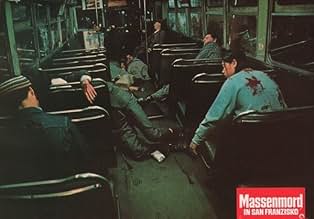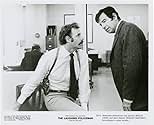IMDb RATING
6.4/10
3.6K
YOUR RATING
In San Francisco, California, one victim in a mass murder is a police detective. His partner and a new partner investigate in the city's seamy side.In San Francisco, California, one victim in a mass murder is a police detective. His partner and a new partner investigate in the city's seamy side.In San Francisco, California, one victim in a mass murder is a police detective. His partner and a new partner investigate in the city's seamy side.
Louis Gossett Jr.
- Larrimore
- (as Lou Gossett)
Don Borisenko
- Collins
- (as Jonas Wolfe)
Frances Lee McCain
- Prostitute
- (as Lee McCain)
Featured reviews
For some reason, this crime drama is almost completely overlooked. Even though it has it's faults, it is mostly a terrific examination of a police investigation. (In fact, in Australia, it was titled "Investigation of a Murder" which is far more apt a title than what it is here.) Matthau plays a police detective whose partner has been gunned down in a mass murder aboard a city bus. He is paired with Dern to find out if there's a connection between the massacre and the policeman's presence on the bus. They form an uneasy alliance (due to their clashing personalities and styles of working) and attempt to solve the baffling case. Gossett makes a strong impression as a fellow detective, though his character sort of drifts out of the picture at some point. Crosby and Cassidy have small, early roles as women who were affected by the murders. What's brilliant about the film is the wondrous verisimilitude and almost complete authenticity of the settings and performances. Only occasionally, can someone be caught "acting". Most of the time, the camera acts in an almost documentary fashion, eavesdropping on the various events and conversations. This type of gritty, realistic, matter-of-fact film is simply not made anymore today. The comparatively simple bus massacre is more striking and vivid than any of the overdone action scenes that litter all of today's films. There's a stark quality to the production that fits it well. Where the film strays is in it's endless cop vignettes which don't always have anything to do with the plot and which distract from, rather than enhance, the story. It's as if the writers tried to include too much from the source novel and wound up muddying the waters of the primary story. This also makes the film hard to follow at times. What's priceless is the display of the unmistakably tacky clothes and furnishings of the 1970's. There are also amusing glimpses into the San Francisco gay bar scene with real patrons displaying their faces (sometimes made up in drag) before the camera. Matthau says little in the film, but holds the attention with his various personal demons and conflicts. He chews gum incessantly and listens to standards on his radio to keep his emotions in check. Dern, as a more lively sort, is a great counterpoint and holds his own nicely. The mystery winds up being not all that big a mystery at all, but there's still a decent payoff with a "French Connection-esquire" car chase through San Francisco.
Not as bad as the other comments would suggest, "The Laughing Policeman" is a police procedural mystery that lacks the spark of great thriller genre films. What this does have is some very good acting, especially from the lead players, and a decent script with interesting characters. The plot does get a little convoluted near the end and the action is inspired by better films, but it is worth a watch. I'd give it a mild recomendation.
Admittedly, the pace of "The Laughing Policeman" is pretty slow, but this is a well plotted murder mystery that gets a lot of juice from the marvelous chemistry between investigating detectives Walter Matthau (as Jake Martin) and Bruce Dern (as Leo Larsen). The supporting cast is likewise excellent and full of familiar faces. Producer / director / uncredited screenwriter Stuart Rosenberg makes great use of San Francisco locations, and keeps viewers intrigued with the police procedural aspect to the tale. The violence is pretty potent, and there's a certain amusement in seeing detectives Martin and Larsen work their way through the seedier environments of SF.
As the movie opens, a cop named Evans (Anthony Costello) follows a man named Niles (Louis Guss) onto a city bus; soon, a character known to Niles gets on board and pumps several passengers full of holes, including Evans and Niles. Martin, who happened to be Evans' partner, gets newly paired up with Larsen to work the case as their superior (Anthony Zerbe) demands results.
What's a joy here is seeing this cast at work. Matthau and Dern contrast nicely; what we come to know about Martin is that despite having a home and family, he's pretty much devoted to his job. Louis Gossett Jr. is fun as one of their colleagues; also making appearances are Val Avery, Cathy Lee Crosby, Mario Gallo, Joanna Cassidy, Paul Koslo, Frances Lee McCain, Clifton James, Gregory Sierra, Warren Finnerty, Matt Clark, and Wayne Grace. Albert Paulsen ("The Manchurian Candidate") has the most interesting role seeing that he actually has next to nothing in the way of dialogue.
The movie may get a little repetitive as it comes full circle at the end, but taking everything into consideration it's a good and solid example of its genre.
Based on the novel "Den Skrattande Polisen" by authors Per Wahloo & Maj Sjowall.
Seven out of 10.
As the movie opens, a cop named Evans (Anthony Costello) follows a man named Niles (Louis Guss) onto a city bus; soon, a character known to Niles gets on board and pumps several passengers full of holes, including Evans and Niles. Martin, who happened to be Evans' partner, gets newly paired up with Larsen to work the case as their superior (Anthony Zerbe) demands results.
What's a joy here is seeing this cast at work. Matthau and Dern contrast nicely; what we come to know about Martin is that despite having a home and family, he's pretty much devoted to his job. Louis Gossett Jr. is fun as one of their colleagues; also making appearances are Val Avery, Cathy Lee Crosby, Mario Gallo, Joanna Cassidy, Paul Koslo, Frances Lee McCain, Clifton James, Gregory Sierra, Warren Finnerty, Matt Clark, and Wayne Grace. Albert Paulsen ("The Manchurian Candidate") has the most interesting role seeing that he actually has next to nothing in the way of dialogue.
The movie may get a little repetitive as it comes full circle at the end, but taking everything into consideration it's a good and solid example of its genre.
Based on the novel "Den Skrattande Polisen" by authors Per Wahloo & Maj Sjowall.
Seven out of 10.
I saw this movie today for the Xth time. As usual, I liked it a lot. So I looked this movie up on imdb.com, to see what they had to say, and was surprised at their Summary for this movie: `Dreary, Empty-Headed Crime Drama.'
I beg to differ. I have always loved this movie. It was released in 1973. It is a perfect picture of San Francisco in the mid-70's. I was there and I recognize everything in it--people, places, and attitudes. This is the pre-AIDS, pre-Yuppie, free-wheeling, getting-used-to-it San Francisco that I loved.
The director (Jack Sommersby) has taken the usual poetic license with the locations, so that the No. 14 Mission bus miraculously goes to Chinatown, and the Transamerica Pyramid is a good view from the Transbay Bus Terminal, but never mind. Any long-time San Franciscan will recognize the sights.
Further, and even better, this is a movie of subtleties--perhaps that is why the IMDB reviewer found it dreary. We are not hit in the face with expository material. The dialogue is not used to describe what can be shown. Early in the movie, the police are confronted with a bus of dead people. Getting on the bus, nobody says `It stinks in here.' Instead, one of the policemen says to the medical examiner, who is smoking a cigar, `Blow some of that smoke over here.' And, without comment, the ME does so. That is how we know it stinks in the bus.
As the policemen look closely at the dead people on the bus, they find that one of them is a policeman. It is, in fact, Matthau's partner. But they never say to each other (and therefore to us) that this victim is a policeman. They show it only in their reactions. Someone says, `My God! It's Hansen!' or words to that effect. `What is he doing on a bus?' and other dialogue let us know that this man is a policeman.
This is a happy change from the tedious obviousness of movies that are full of lines like, `You know, Jack, you are a happy-go-lucky person. Your face shows it.' Jack sits there like the lump he is, looking neither happy nor unhappy. We have to believe the speaker, because the acting isn't going to give us this information. A good director would eliminate this line, and get some happy-face acting from Jack.
It is good to see a movie directed by someone who thinks we are smart enough to get the point without being hit over the head with it. The advice usually given to beginning writers is also good for experienced directors: Don't tell us. Show us.
The laughing policeman is Bruce Dern--new to homicide investigations, and without subtleties. He laughs a lot. Matthau is the old-timer, who never laughs. He is also not a subtle person, but he is at least cautious. They are the beagle puppy and experienced retriever of the world of murder. They are oil and water, definitely not blending.
The plot is absurd, but it hardly matters. It is the chase. It is the location. It is the ambience (dreadful, overused word, but there it is; it is the right word) that counts in this movie.
Finding it on TV is hard these days. I found it recently on Black Starz TV. Fortunately for us all, Lou Gossett, Jr. is in it, so it will show up on channels catering to African Americans. Hunt for it. It's worth it.
IMDB.com uses the 10-star rating system. Following their lead, I give it 5 stars for plot, and 9 stars for faithful depiction of a time and place.
I beg to differ. I have always loved this movie. It was released in 1973. It is a perfect picture of San Francisco in the mid-70's. I was there and I recognize everything in it--people, places, and attitudes. This is the pre-AIDS, pre-Yuppie, free-wheeling, getting-used-to-it San Francisco that I loved.
The director (Jack Sommersby) has taken the usual poetic license with the locations, so that the No. 14 Mission bus miraculously goes to Chinatown, and the Transamerica Pyramid is a good view from the Transbay Bus Terminal, but never mind. Any long-time San Franciscan will recognize the sights.
Further, and even better, this is a movie of subtleties--perhaps that is why the IMDB reviewer found it dreary. We are not hit in the face with expository material. The dialogue is not used to describe what can be shown. Early in the movie, the police are confronted with a bus of dead people. Getting on the bus, nobody says `It stinks in here.' Instead, one of the policemen says to the medical examiner, who is smoking a cigar, `Blow some of that smoke over here.' And, without comment, the ME does so. That is how we know it stinks in the bus.
As the policemen look closely at the dead people on the bus, they find that one of them is a policeman. It is, in fact, Matthau's partner. But they never say to each other (and therefore to us) that this victim is a policeman. They show it only in their reactions. Someone says, `My God! It's Hansen!' or words to that effect. `What is he doing on a bus?' and other dialogue let us know that this man is a policeman.
This is a happy change from the tedious obviousness of movies that are full of lines like, `You know, Jack, you are a happy-go-lucky person. Your face shows it.' Jack sits there like the lump he is, looking neither happy nor unhappy. We have to believe the speaker, because the acting isn't going to give us this information. A good director would eliminate this line, and get some happy-face acting from Jack.
It is good to see a movie directed by someone who thinks we are smart enough to get the point without being hit over the head with it. The advice usually given to beginning writers is also good for experienced directors: Don't tell us. Show us.
The laughing policeman is Bruce Dern--new to homicide investigations, and without subtleties. He laughs a lot. Matthau is the old-timer, who never laughs. He is also not a subtle person, but he is at least cautious. They are the beagle puppy and experienced retriever of the world of murder. They are oil and water, definitely not blending.
The plot is absurd, but it hardly matters. It is the chase. It is the location. It is the ambience (dreadful, overused word, but there it is; it is the right word) that counts in this movie.
Finding it on TV is hard these days. I found it recently on Black Starz TV. Fortunately for us all, Lou Gossett, Jr. is in it, so it will show up on channels catering to African Americans. Hunt for it. It's worth it.
IMDB.com uses the 10-star rating system. Following their lead, I give it 5 stars for plot, and 9 stars for faithful depiction of a time and place.
This sullen, violent police drama is as detailed an investigation as you will find on film. The opening scene of The Laughing Policeman is extremely tense and sets the tone for a Dirty-Harry-style flick that delivers one of Matthau's moodiest performances. Basically, a mass murder takes place on a San Francisco bus, and we find out that a policeman was one of the victims. He turns out to be Matthau's late partner. Bruce Dern is assigned to be his new partner, working with Matthau, a conflict of interest, to find out why this SFPD detective was on the bus in the first place. Their subsequent relationship is a play the standard, portrayed in the Laughing Policeman as "mute cop/bad cop". So, teams of gritty cops (a young Lou Gossett) meander through the roughest neighborhoods of San Francisco bullying pimps, pushers, hip drag queens and sidewalking street-wheelers in an attempt uncover what turns out to be a very complex underworld fraternity. The purpose (seeing as this plays as a Matthau character study), to quell Matthau's melancholic contribution to this Dirty Harry spin-off. It is more violent and much more precise than Dirty Hary but not as entertaining. A must see, however, for all Matthau fans.
Did you know
- TriviaAccording to Bruce Dern's autobiography, it was Walter Matthau's idea to have Dern, known mainly as a character actor, share top billing with him for this film, a gesture for which Dern was most grateful.
- GoofsThe actual gun used in the film is a Smith & Wesson M76 9mm machine gun without the barrel shroud and not an M3 .45 caliber "Grease Gun" made by GM Guide Lamp Division for WWII use. The omission of the barrel shroud gives the appearance of an M3. If one sticks to the story line, the M3 magazine held 30 rounds .45 ACP and cycled around 450 rpm. This is sufficient to inflict the damage and wounds shown in the film.
- Quotes
Insp. James Larrimore SFPD: [to pimp he has just pushed to the floor] Whatever you're reaching for better be a sandwich, 'cause you're gonna have to eat it!
- ConnectionsEdited into The Green Fog (2017)
- How long is The Laughing Policeman?Powered by Alexa
Details
- Release date
- Country of origin
- Language
- Also known as
- The Laughing Policeman
- Filming locations
- 156 Robinhood Drive, San Francisco, California, USA(Jake Martin's home)
- Production company
- See more company credits at IMDbPro
Box office
- Budget
- $2,280,000 (estimated)
Contribute to this page
Suggest an edit or add missing content



